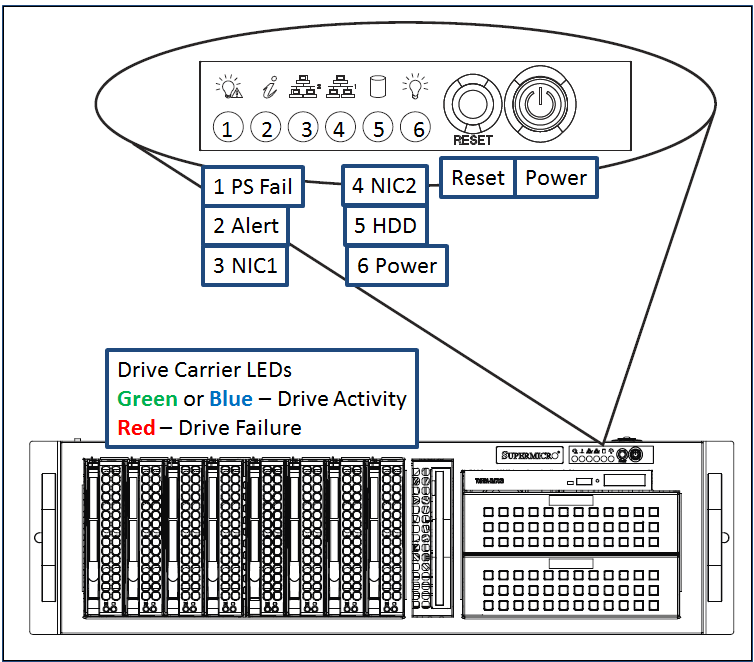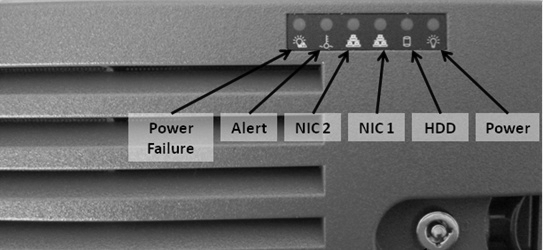Server front panel indicators and controls¶
For security purposes, a locking front cover prevents access to drive bays, auxiliary drives and the power and reset buttons. With the security panel installed, only the system-level status LEDs are visible.
Note: There may be minor differences in panel indicators depending on the specific server and configuration.

Figure: Typical server indicators and controls (security panel removed)¶
Power on and shut down¶
To power up the server, remove the locking front panel security cover and press the power switch.
After powering up the Volicon Media Intelligence service server, wait for the login screen to appear. If you are logging in to the system for the first time, consult the “Read me first” guide, or contact the Volicon Media Intelligence service support team.
Note: Volicon Media Intelligence service runs as a service (configured by default) and does not require a user/admin login to operate.
To shut down Volicon Media Intelligence service from the console, use the MS Windows <Start>→<Shutdown> sequence. To restart the server, use the <Start>→<Restart> menu.
Caution
DO NOT remove power or press the <Reset> button to reboot the server. This uncontrolled shutdown can corrupt the application database and require re-indexing by a Volicon Media Intelligence service support engineer.
If the Windows UI is not accessible, use the front panel <Power> button to perform an orderly server shutdown
Server front panel indicators¶
There are several LED indicators on the control panel, and others on the drive carriers, to keep you informed of the overall system status and the activity and health of specific components.

Figure: Volicon Media Intelligence service front panel indicators (security panel in place)¶
Indicators:
 Power failure: When this LED flashes, it indicates one of the power supplies has failed.
Power failure: When this LED flashes, it indicates one of the power supplies has failed.

Alert status |
Description |
Constant red |
An overheat condition has occurred, possibly caused by cable congestion. |
Blinking red (1Hz) |
This indicates a fan failure. Check for an inoperative fan. |
Blinking red (0.25Hz) |
This indicates a power failure. Check for a non-operational power supply. |
Constant blue |
Local UID has been activated. Use this function to locate the server in a rack mount environment. |
Blinking blue |
The remote UID is on. Use this function to identify the server from a remote location. |
 NIC2 indicates network activity on LAN2 when flashing.
NIC2 indicates network activity on LAN2 when flashing.
 NIC1 indicates network activity on LAN1 when flashing.
NIC1 indicates network activity on LAN1 when flashing.
 HDD indicates IDE channel activity, SAS/SATA drive and/or DVD-ROM drive activity when flashing.
HDD indicates IDE channel activity, SAS/SATA drive and/or DVD-ROM drive activity when flashing.
 Power indicates power is being supplied to the system’s power supply units. This LED should normally be illuminated when the system is operating.
Power indicates power is being supplied to the system’s power supply units. This LED should normally be illuminated when the system is operating.
Drive carrier indicators¶
Each drive carrier has two status LEDs. They are normally hidden behind the security panel. Remove the panel to access the drive bays.
Activity LED green or blue indicates the drive activity and flashes when the drive is accessed.
Status LED red indicates drive failure.
Power supply indicator¶
Some power supplies have a status LED located on the power supply – visible from the rear of the chassis.
Solid green indicates the supply is on and operating normally.
Solid amber indicates the supply is plugged in and turned off or in an abnormal state.
Blinking amber indicates overtemperature and the supply temperature has reached 63°C. The system will automatically power down if the supply reaches 70°C, and it will restart when the supply cools down to 60°C.